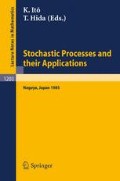Abstract
In order to investigate under what conditions an altruistic trait evolves through group selection, the following diffusion model is formulated. Consider a species consisting of an infinite number of competing groups (demes) each having a constant number of reproducing members and in which mating is at random. Then consider a gene locus and assume a pair of alleles A and A', where A' is the "altruistic allele." Let x be the relative frequency of A' within a deme, and let φ = φ(x; t) be the density function of x at time t such that φ(x; t)Δx represents the fraction of demes whose frequency of A' lies in the range (x, x + Δx). Then, we have
where Mδx and Vδx stand for the mean and variance of the change in x per generation (due to mutation, migration, individual selection and random sampling of gametes) within demes, and c is a positive constant (called the coefficient of interdeme competition) and \(\bar x\) is the mean of x over the species, i.e. \(\bar x = \int_0^1 {x\phi } dx\). By studying the above diffusion equation at steady state (∂φ/∂t = 0), a condition is obtained for group selection to prevail over individual selection in the evolution of an altruistic trait.
Access this chapter
Tax calculation will be finalised at checkout
Purchases are for personal use only
Preview
Unable to display preview. Download preview PDF.
References
Aoki, K. (1982). A condition for group selection to prevail over counteracting individual selection. Evolution, 36, 832–842.
Boorman, S. A. & Levitt, P. R. (1973). Group selection on the boundary of a stable population. Theor. Pop. Biol., 4, 85–128.
Crow, J. F. & Kimura, M. (1970). An Introduction to Population Genetics Theory. New York: Harper & Row, reprinted (1977) by Burgess, Minneapolis, MN.
Darwin, C. (1859). The Origin of Species by Means of Natural Selection. London: John Murray.
Karlin, S. & Taylor, H. M. (1981). A Second Course in Stochastic Processes. New York: Academic Press.
Kimura, M. (1964). Diffusion models in population genetics. J. Appl. Probab., 1, 177–232.
Kimura, M. (1971). Theoretical foundation of population genetics at the molecular level. Theor. Pop. Biol., 2, 174–208.
Kimura, M. (1983a). The Neutral Theory of Molecular Evolution. Cambridge Univ. Press, Cambridge, England.
Kimura, M. (1983b). Diffusion model of intergroup selection, with special reference to evolution of an altruistic character. Proc. Natl. Acad. Sci. USA, 80, 6317–6321.
Kimura, M. & Ohta, T. (1971). Theoretical Aspects of Population Genetics. Princeton: Princeton Univ. Press.
Nei, M. (1975). Molecular Population Genetics and Evolution. Amsterdam: North-Holland.
Ohta, T. & Kimura, M. (1971). Linkage disequilibrium between two segregating nucleotide sites under the steady flux of mutations in a finite population. Genetics 68, 571–580.
Wilson, E. O. (1975). Sociobiology. The Belknap Press of Harvard Univ. Press.
Wright, S. (1931). Evolution in Mendelian populations. Genetics 16, 97–159.
Wright, S. (1938). The distribution of gene frequencies under irreversible mutation. Proc. Natl. Acad. Sci. USA, 24, 253–259.
Author information
Authors and Affiliations
Editor information
Rights and permissions
Copyright information
© 1986 Springer-Verlag
About this paper
Cite this paper
Kimura, M. (1986). Diffusion model of population genetics incorporating group selection, with special reference to an altruistic trait. In: Itô, K., Hida, T. (eds) Stochastic Processes and Their Applications. Lecture Notes in Mathematics, vol 1203. Springer, Berlin, Heidelberg. https://doi.org/10.1007/BFb0076876
Download citation
DOI: https://doi.org/10.1007/BFb0076876
Published:
Publisher Name: Springer, Berlin, Heidelberg
Print ISBN: 978-3-540-16773-0
Online ISBN: 978-3-540-39852-3
eBook Packages: Springer Book Archive

